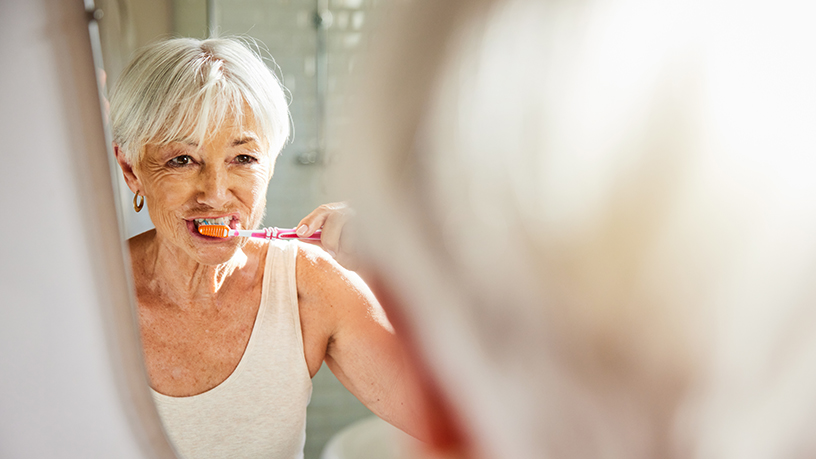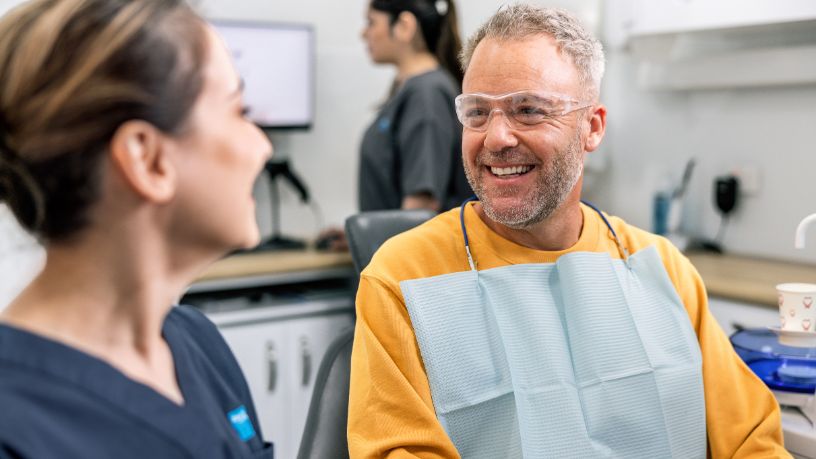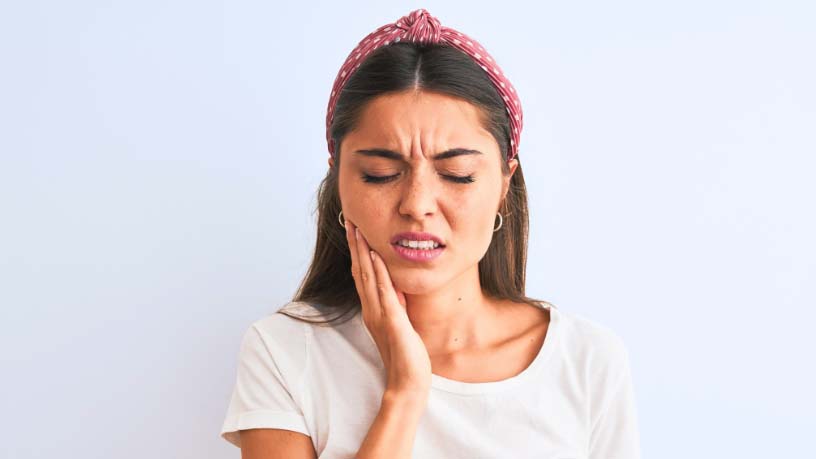Key takeaways
- If you involuntarily grind or clench your teeth, either at night or while you’re awake, you may be experiencing bruxism.
- Bruxism affects around half of all people at some stage in their lifetimes, and it can happen during the day or during sleep.
- There’s a range of treatment and management options for bruxism, including dental intervention and stress management.
What is bruxism?
Around half of all people grind their teeth at some point throughout their lifetimes, but only a small percentage of us do it to the point that it requires clinical treatment.1
Bruxism happens when you grind or clench your teeth, often involuntarily and commonly while you’re asleep (although it can occur when you’re awake too). The condition can affect anyone at any stage of their life.
The cause of bruxism can be physical, psychological or genetic.
Often, it’s associated with another sleep disorder, such as insomnia, snoring or sleep apnoea, but it can also be associated with conditions like ADHD or gastric reflux. Things like stress, anxiety and depression also tend to play a big role.
Other potential causes of bruxism include:
- caffeine or alcohol consumption
- smoking or vaping
- drug use (such as cocaine or amphetamines)
- prescription medications (such as antidepressants)
- certain medical conditions (including Alzheimer’s, Parkinson’s and Down Syndrome).
Often, people will grind their teeth in their sleep and not be aware of it until a dentist or loved one flags the issue. But there are a few signs that you can look out for, including:
- cracked or chipped tooth enamel
- worn down teeth
- broken teeth or restorations (like fillings)
- jaw pain or strain
- jaw muscles that are enlarged
- dull headache starting at your temples
- sensitive teeth.1
If you find yourself waking up with a headache or sore neck, it could also point to bruxism.
Damage to your teeth and sleep
As well as dental issues like cracked fillings, flattened, loose or chipped teeth, gum recession, and Temporomandibular Joint Disorder, teeth grinding can lead to a range of health and wellbeing issues.
When experienced at night, bruxism can affect the quality of your sleep. When you grind your teeth at night you generally do so in the early stages of sleep (over several cycles), which can cause you to repeatedly wake up before you enter deep sleep.2
Getting a good night’s sleep is important for a variety of reasons. When it comes to your teeth, it allows an adequate flow of saliva, which can help to strengthen tooth enamel (via nutrients like calcium and phosphate), reduce the risk of tooth decay and prevent gum disease.3
Parents may notice that their children grind their teeth at night. This is generally not something to be worried about, as it’s usually something kids grow out of. However, based on the extent and period of the grinding, it might be worth talking to a dentist about it.
How to treat bruxism
If bruxism is severe, your dentist may recommend an overnight study at a sleep clinic (known as a ‘polysomnography’) to determine your bruxism. This is the most comprehensive way to diagnose the condition, and it may also help to determine other related sleep disorders, like sleep apnoea.
When it comes to treating bruxism, there are a few treatment options. These include:
- A nightguard or splint. These can be custom made by your dentist based on a mould or scan of your mouth, and may prevent further damage to your teeth when worn over your teeth while you sleep.
- Botox injections. In more severe cases of bruxism, Botox can be injected into your jaw muscles, which can help to relax them and reduce excessive, involuntary movement.
However, treating the underlying cause behind bruxism first is recommended. This may include:
- Stress or anxiety management
- Jaw relaxation therapy
- Muscle relaxants
- Treating medical conditions (such as Parkinson’s)
You might also investigate other sleep issues, like apnoea, and modify your lifestyle to reduce or eliminate things like caffeine, alcohol or nicotine.
Likewise, treating bruxism often involves finding more effective ways to identify and manage stress. Stress management techniques like meditation and regular exercise can improve your sleep quality and may help reduce things like teeth grinding. You might also consider reducing screen time before bed, sticking to a consistent sleep cycle and ensuring that your room is cool and well-ventilated at night.
Find your nearest Bupa Dental Clinic

At Bupa, trust is everything
Our health and wellbeing information is regularly reviewed and maintained by a team of healthcare experts, to ensure its relevancy and accuracy. Everyone's health journey is unique and health outcomes vary from person to person.
This content is not a replacement for personalised and specific medical, healthcare, or other professional advice. If you have concerns about your health, see your doctor or other health professional.
1 Better Health Channel. (2020). Teeth grinding. Victoria State Government, Department of Health.
2 Yap, A. U., & Chua, A. P. (2016). Sleep bruxism: Current knowledge and contemporary management. Journal of conservative dentistry, 19(5), 383-389.
3 Kurtović, A., Talapko, J., Bekić, S., & Škrlec, I. (2023). The Relationship between Sleep, Chronotype, and Dental Caries-A Narrative Review. Clocks & sleep, 5(2), 295-312.
You might also like
Mistakes to avoid when brushing your teeth
Are you brushing your teeth too quickly? Find out how a 2-minute routine can protect your gums, enamel, and overall oral health.
The hard truth about soft drinks and your teeth
Sugary and acidic drinks can erode tooth enamel, leading to decay. Learn how to minimize damage and maintain a healthy smile.
7 simple ways to look after your dental health at home
You might have brushed your teeth every day of your life, but you may be getting some things wrong. Learn how to improve your dental game with expert tips.
Bruxism: The teeth disorder you might be sleeping on
If you’re having trouble sleeping, your teeth might be to blame. Find out how bruxism may be affecting you.





